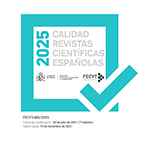Transformations in Local Participatory Governance of Social Policy in Municipalities of Greater Buenos Aires in Pandemic Times
Abstract
The structuring of urban social policies in Greater Buenos Aires is increasingly oriented towards a decentralized governance model, with a management framework formed by the three levels of government in Argentina, and the participation of territorially based civil society at different times in the policy cycle. When the COVID-19 pandemic broke out, the agenda and management processes of several urban social policies were altered. Considering this, this article addresses the question of how the pandemic has impacted local governance and, particularly, the development of participatory management mechanisms. We focus on three policy fields with long-standing participatory traditions: a) the promotion and protection of children's rights, a policy area where Local Councils for Children and Teenagers have emerged; b) the state response to the problem of popular habitat, which is the focus of the Local Habitat Councils; and c) the problem of gender violence, which is organized at the local level through intersectoral gender roundtables.
Downloads
Article download
License
In order to support the global exchange of knowledge, the journal Geopolítica (s) Revista de estudios sobre espacio y poder is allowing unrestricted access to its content as from its publication in this electronic edition, and as such it is an open-access journal. The originals published in this journal are the property of the Complutense University of Madrid and any reproduction thereof in full or in part must cite the source. All content is distributed under a Creative Commons Attribution 4.0 use and distribution licence (CC BY 4.0). This circumstance must be expressly stated in these terms where necessary. You can view the summary and the complete legal text of the licence.









